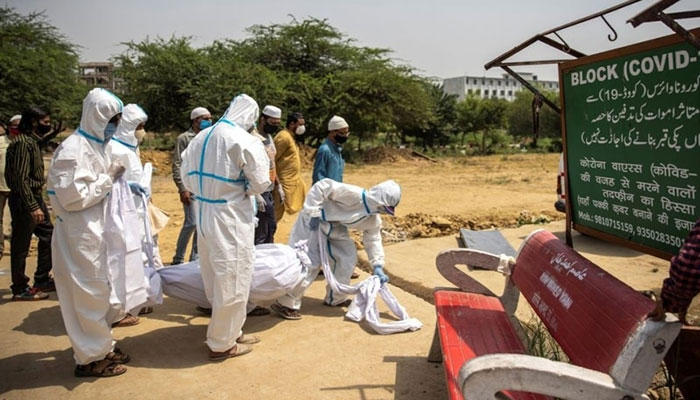Indian virus surge raises questions about Modi’s competence
ISLAMABAD: India’s hospitals were packed with coronavirus patients, relatives of the sick scrambled to find supplies of oxygen, and crematoriums were running near full capacity to handle the dead.
On Wednesday, India reported as many as 3,841 deaths and 406,628 infections with death toll crossing 230,000, international media reported. Yet despite those clear signs of an overwhelming health crisis, Prime Minister Narendra Modi pressed ahead with a densely packed campaign rally.
“I have never seen such a huge crowd before!” he roared to his supporters in West Bengal state on April 17, before key local elections. “Wherever I can see, I can only see people. I can see nothing else.”
As another deadly wave of COVID-19 infections was swamping India, Modi’s government refused to cancel a giant Hindu festival. Cricket matches, attended by tens of thousands, carried on, too.
The catastrophic surge has badly dented Modi’s political image after he drew praise last year for moving quickly to lock down India’s nearly 1.4 billion people. Now, he’s been called a “super-spreader” by the vice president of the Indian Medical Association, Dr Navjot Dahiya.
With deaths mounting and a touted vaccine rollout faltering badly, Modi has pushed much of the responsibility for fighting the virus onto poorly equipped and unprepared state governments and even onto patients themselves, critics say.
“It is a crime against humanity,” author and activist Arundhati Roy said of Modi’s handling of the virus. “Foreign governments are rushing to help. But as long as decision-making remains with Modi, who has shown himself to be incapable of working with experts or looking beyond securing narrow political gain, it will be like pouring aid into a sieve.”
The 70-year-old, whose image as a technocrat brought him deep approval from a middle class weary of corruption and bureaucratic dysfunction, has been accused of stifling dissent and choosing politics over public health.
When the official COVID-19 death toll crossed 230,000 — a number experts say is a severe undercount — Modi was silent. His government says it is on a “war footing,” ramping up hospital capacity, supplies of oxygen and drugs.
“The present COVID pandemic is a once-in-a-century crisis,” Information and Broadcasting Minister Prakash Javadekar said. “All efforts are being made to overcome the situation by the central government in close coordination with the state governments and society at large.”
When Modi won national elections in 2014, he presented himself as someone who could unlock economic growth by merging business-friendly policies with a Hindu nationalist ideology. Critics saw him as craving power over the national welfare and catering to his Hindu nationalist base. They blamed him — although courts exonerated him — in the bloody 2002 anti-Muslim riots in Gujarat state, where he was chief minister.
The economy tumbled after his government overhauled India’s cash supply and introduced a goods and services tax. Yet, he easily won reelection in 2019 on a wave of nationalism following clashes with Pakistan.
Cases rose when the country started reopening in June 2020, and the government developed emergency infrastructure plans. When the wave receded and reported cases plummeted over the winter, many officials saw it as a triumph. States dismantled makeshift hospitals and delayed adding ICU beds and ventilators.
-
 King Charles Anxious As Uncertainty Grows Over Sarah Ferguson’s Next Move
King Charles Anxious As Uncertainty Grows Over Sarah Ferguson’s Next Move -
 Real Reason Kim Kardashian Is Dating Lewis Hamilton
Real Reason Kim Kardashian Is Dating Lewis Hamilton -
 Rihanna Leaves Elderly Woman Star-struck In Viral Grocery Store Video
Rihanna Leaves Elderly Woman Star-struck In Viral Grocery Store Video -
 TikTok US Launches Local Feed Using Precise Location Data
TikTok US Launches Local Feed Using Precise Location Data -
 Jill Biden’s Former Husband Charged With Wife’s Murder
Jill Biden’s Former Husband Charged With Wife’s Murder -
 Zayn Malik Reveals Parenting Decision Gigi Hadid Criticized Him Over
Zayn Malik Reveals Parenting Decision Gigi Hadid Criticized Him Over -
 Palace Releases Prince William's Photos From Final Day Of His Saudi Arabia Visit
Palace Releases Prince William's Photos From Final Day Of His Saudi Arabia Visit -
 Microsoft Warns Of AI Double Agents As Enterprise Adoption Of AI Agents Surges
Microsoft Warns Of AI Double Agents As Enterprise Adoption Of AI Agents Surges -
 Kate Middleton, Prince William Break Silence Over Tragic Shooting In Canada
Kate Middleton, Prince William Break Silence Over Tragic Shooting In Canada -
 'Finding Her Edge' Star Madelyn Keys Explains Adriana's Remarks About Brayden Romance
'Finding Her Edge' Star Madelyn Keys Explains Adriana's Remarks About Brayden Romance -
 Royal Expert Raises Questions Over Sarah Ferguson's 'plotting' Stunning Comeback
Royal Expert Raises Questions Over Sarah Ferguson's 'plotting' Stunning Comeback -
 Instagram Develops AI ‘Create My Likeness’ Tool To Generate Personalised Photos And Videos
Instagram Develops AI ‘Create My Likeness’ Tool To Generate Personalised Photos And Videos -
 Meghan Markle, Prince Harry Friends Suggest Their Marriage 'isn't All It Seems'
Meghan Markle, Prince Harry Friends Suggest Their Marriage 'isn't All It Seems' -
 Andrew Handed Out 'classified' Information To Jeffrey Epstein
Andrew Handed Out 'classified' Information To Jeffrey Epstein -
 Margot Robbie Recalls Wild Party Days And Getting Kicked Out Of Clubs
Margot Robbie Recalls Wild Party Days And Getting Kicked Out Of Clubs -
 NASA's Hubble Space Telescope Discovers ‘Dracula Disk', 40 Times Bigger Than Solar System
NASA's Hubble Space Telescope Discovers ‘Dracula Disk', 40 Times Bigger Than Solar System




